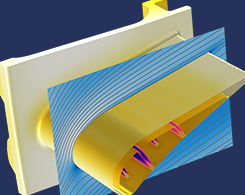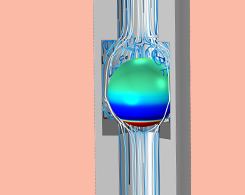General Blog Posts

Simulation Applications Enable Digitalization at ABB Traction Motors
Here’s a real-world example of optimizing R&D processes with COMSOL Server™: At ABB Traction Motors, engineers use simulation applications to analyze CFD and heat in electric motor designs.

Using Geometry Parts and Part Libraries in COMSOL Multiphysics®
If you’re working with a model that contains complex geometries, you can use geometry parts and the part libraries to streamline and simplify your model setup.

Digital Twins and Model-Based Battery Design
By combining high-fidelity multiphysics models with lightweight models and measured data, engineers can create digital twins to understand, predict, optimize, and control real-world systems.

Digital Twins: Not Just Hype
The term “digital twin” has been called everything from just hype to a revolutionary concept. We use a jet engine example to explain the concept of digital twins and how simulation fits in.

Simulating Fluid-Structure Interaction in a Ball Check Valve
Simulate FSI in a ball check valve to find the flow rate, fluid pressure, and fluid velocity. The COMSOL® software includes a predefined multiphysics coupling that makes it simple.

2 Mesh Adaptation Methods: Enabling More Efficient Computations
Why adapt your mesh? For one thing, it helps you solve your computational problems more efficiently. Here, we show you 2 methods for adapting your mesh in COMSOL Multiphysics®.

Keynote Video: Enhancing STEM Education with Simulation
Ivana Milanovic uses simulation to teach undergraduate students in her science, technology, engineering, and math (STEM) courses, as she explains in her COMSOL Conference 2018 presentation.

A Guide to Publishing and Licensing Simulation Applications
Interested in protecting the proprietary rights of the simulation applications you create and distribute? We walk you through 2 ways to set up licensing terms and conditions.
